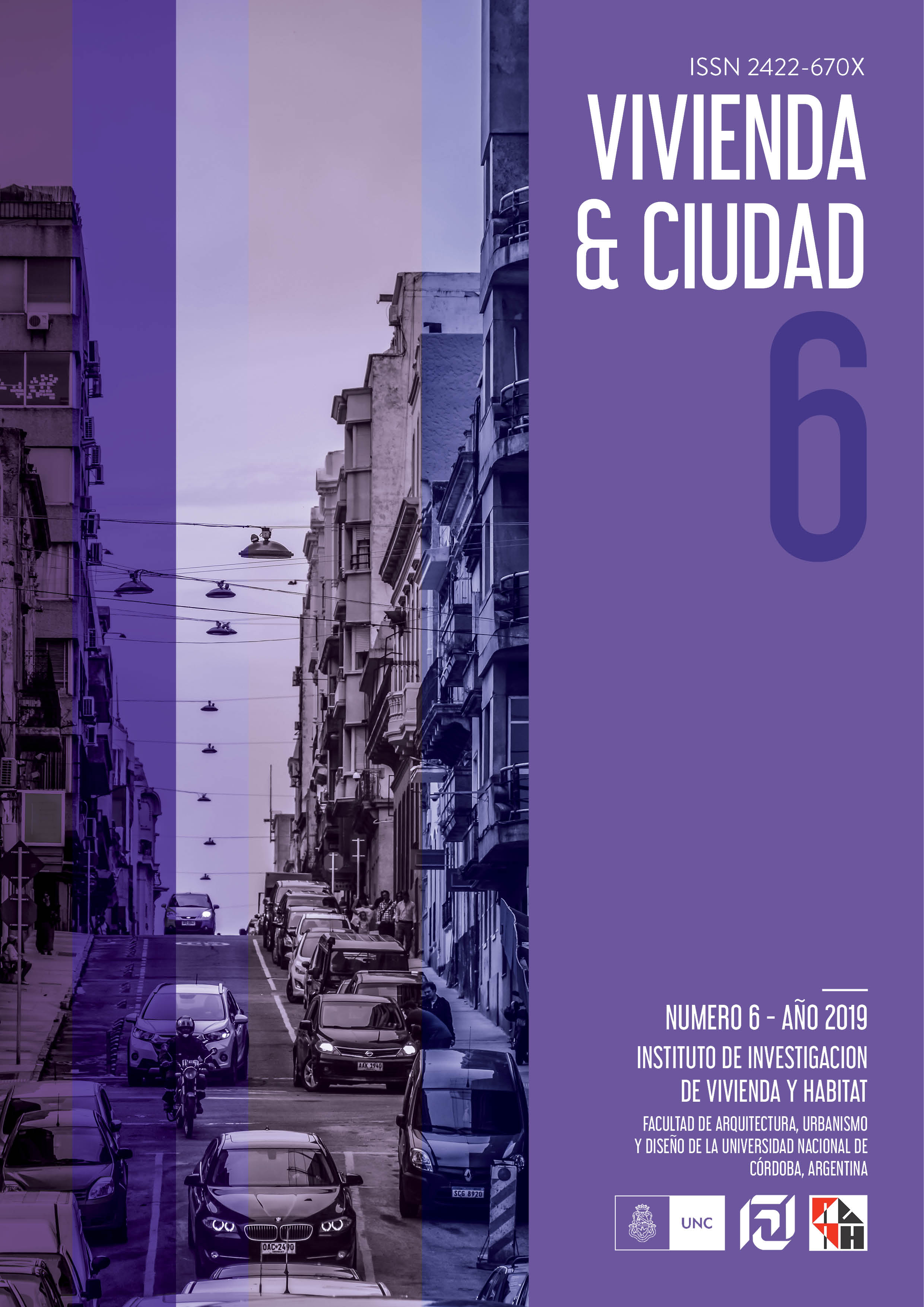Gender and right to the city: keys to think about the emerging inequality(ies) and territoriality(ies) in the Tucuman metropolitan area.
Keywords:
habitat, urban agenda, genderAbstract
The paper presents a research about public habitat policies from new approaches. It is proposed to reflect on the contributions of gender as an analytical category and political concept to operationalize the right to the city.
It exposes some elements of the work presented at the first meeting of the Network of Popular Settlements about the right to the city: conflicts and disputes over urban territory. This work expands the analysis of previous studies on the contributions of the gender perspective in the habitat policies issue in relation to inequality and vulnerability, from the articulation of dimensions (material, symbolic and political).
The case of the Tucuman metropolitan agglomerate is analyzed in the framework of a comparative study on other Latin American metropolis. It also reflects on the responses regarding habitat policy and the construction of territoriality, in the context of the disciplinary challenges of the right to the city and new problems, advances and backward movement of the neoliberal advance in the region.
References
Ascher, F. (2001) Los nuevos principios del Urbanismo. España. Alianza Editorial.
Bonacina, Czytajlo, Casares (et.al.) (2018) Indice de vulnerabilidad y bienestar social: Aportes para el análisis y políticas públicas de igualdad en espacios metropolitanos. CLACSO, Buenos Aires, noviembre 2018.
Casares, M.; Czytajlo, N.; Llomparte, P. (2019) Aportes del Observatorio Metropolitano a los ODS. Jornadas IDET, Tucumán, Setiembre 2019.
Catenazzi, A.; Reese, E. (2016) Argentina: a 20 años de Hábitat II, las asignaturas pendientes. En Cohen, M. (et.al.) Hábitat en deuda. Ed. Prometeo, Bs. As.
CEPAL (2017) Panorama multidimensional del desarrollo urbano en América Latina y el Caribe. Montero, L. García, J. Ed. Naciones Unidas, Santiago.
CEPAL (2016). La matriz de la desigualdad social en América Latina. Santiago de Chile, Chile: Naciones Unidas. Recuperado de: http://repositorio.cepal.org/bitstream/handle/11362/40668/S1600946_es.pdf?sequence=4&isAllowed=y
CEPAL (2015). Panorama del desarrollo territorial en América Latina y el Caribe, 2015. Pactos para la igualdad territorial. Santiago de Chile, Chile: Naciones Unidas. Recuperado de: http://repositorio.cepal.org/bitstream/handle/11362/39223/S1500808_es.pdf?sequence=1
Champion Ott, N. (2018) Análisis de la incorporación de la perspectiva de género en el Programa de Mejoramiento de Barrios, ejecutado en el Departamento de Montevideo, Uruguay, entre 2001 y 2016. Tesis para optar por el grado académico de Magíster en Género, Sociedad y Políticas. Directora de Tesis: Dra. Natalia Paola Czytajlo. Fecha: (21/12/18)
Cravino, M.C.; Duarte, J.I.; Del Río, J.P. 2008. Magnitud y crecimiento de las villas y asentamientos en el AMBA en los últimos 25 años. Buenos Aires: ULACAV.
Cuenya, B. (2016) La política urbana frente a la mercantilización y elitización de la ciudad: algunas reflexiones y referencias a la situación argentina. En Cuaderno Urbano. Espacio, Cultura, Sociedad. Vol. 21, N.º 21.
Czytajlo, N. (2013). Espacio, género y pobreza. Discursos, prácticas y subjetividades. Políticas sociohabitacionales en Tucumán (2004-2008). Cuadernos de Investigación Urbanística, 6 (90): 1-87. Disponible en: http://polired.upm.es/index.php/ciur/article/view/2098/2174
Czytajlo, N. (2017a) Desigualdades socio-territoriales y de género en espacios metropolitanos. Revista Bitácora Urbano-Territorial; Bogotá; Año: 2017 vol. 27.
DAMI. Lineamientos Estratégicos para la gestión territorial del Área Metropolitana de Tucumán. Ministerio del Interior, Obras Públicas y Transporte. Unidad Ejecutora Central. Programa de Desarrollo de Áreas Metropolitanas del Interior DAMI (BID 2499 OC AR). Gobierno de la provincia de Tucumán. Ministerio de Economía. Unidad Ejecutora Provincial. Unidad Ejecutora del Proyecto. Universidad Nacional de Tucumán. Facultad de Arquitectura y Urbanismo. Observatorio de Fenómenos Urbanos y Territoriales.Disponible en: http://www.dami.uec.gov.ar/wp-content/uploads/2017/03/informe-final-lem-tucuman.pdf. Fecha de consulta 2018.
Falú, A. (2014) El derecho de las mujeres a la ciudad. Espacios públicos sin discriminaciones y violencias. En Revista Vivienda y Ciudad. Número 1. 2014.
Falú, A. La omisión de género en el pensamiento de las ciudades, en Borja, Jordi,
Falú, A; Segovia, O. (2007). Ciudades para convivir: sin violencias hacia las mujeres. Debates para la construcción de propuestas. Santiago de Chile: Ediciones SUR.
Firkowski, O. Moura, R. (2015) Curitiba: transformações na ordem urbana. Letra Capital Editora LTDA.
Firkowski, O.; Casares, M.; Nunes da Silva, M.; Czytajlo, N.; Volochko, D. (2017) Estudios Urbanos Comparados: oportunidades y desafios de la investigación en América Latina. San Miguel de Tucumán: Universidad Federal de Paraná – Universidad Nacional de Tucumán. ISBN 950-895-146-X. Disponible en formato electrónico. http://observatoriodasmetropoles.net.br/wp/estudos-urbanos-comparados-para-america-latina/
Fortini, M. Czytajlo, N. (2016) Mapa de asentamientos informales en el aglomerado de Tucumán: herramientade política pública. Informe. Instituciones: Observatorio de Fenómenos Urbanos y Territoriales -OFUT - IPDU- Facultad de Arquitectura y Urbanismo - UNT (Resp. Casares, M.) Instituto Provincial de Vivienda y Desarrollo Urbano (Resp. Correa, E.). Colaboradora: López, J.
Garnier, J. (2010) Del derecho a la vivienda al derecho a la ciudad: ¿De qué derechos humanos hablamos? y con qué derecho? En Biblio 3W. REVISTA BIBLIOGRÁFICA DE GEOGRAFÍA Y CIENCIAS SOCIALES, Universidad de Barcelona. ISSN: 1138-9796. Depósito Legal: B. 21.742-98. Vol. XVI, nº 909, 5 de febrero de 2011.
Muxí, Z. (2006) Ciudad próxima, urbanismo sin género. En Ingeniería y territorio, ISSN 1695-9647, Nº. 75, págs. 68-75.
Palero, J. (2016) El derecho a la ciudad, según Henri Lefebvre. Del libro al movimiento. En Revista Vivienda y Ciudad.
Polidoro, M.; Czytajlo, N.; Casares, M. Carências e vulnerabilidades em metrópoles periféricas: análise comparativa entre Curitiba, Brasil e San Miguel de Tucumán, Argentina. En Revista Confins (Franco- Brasilera).
Segura, R. El espacio urbano y la (re)producción de desigualdades sociales Desacoples entre distribución del ingreso y patrones de urbanización en ciudades latinoamericanas. Working Paper Series. desigualdades.net Research Network on Interdependent Inequalities in Latin America. Disponible::https://www.iai.spkberlin.de/fileadmin/dokumentenbibliothek/desigualdades/workingpapers/65_WP_Segura_Online.pdf
Silva, M.; Czytajlo, N., Monayar, V. 2016. Favelas e Villas: resiliências e inovaçõesna (re)produção das metrópoles de Curitiba, Tucumán e Córdoba. En XVII ENANPUR, San Pablo, 2017.
Downloads
Published
Issue
Section
License
Authors who publish in this journal agree to the following terms:
a. Authors retain copyright and guarantee to the journal the right to be the first publication of the work as well as licensed under a Creative Commons Attribution-ShareAlike 4 license.
b. Authors may separately establish additional agreements for non-exclusive distribution of the version of the work published in the journal (e.g., placing it in an institutional repository or publishing it in a book), with an acknowledgement of its initial publication in this journal.
c. Authors are permitted and encouraged to disseminate their work electronically (e.g., in institutional repositories or on their own website) before and during the submission process, as this may result in productive exchanges, as well as earlier and greater citation of published work (See The Effect of Open Access).
d. 4.0 International Creative Commons Attribution-ShareAlike 4.0 License.










